Practice Question - 53 (Selection with Condition) | 100 DILR Questions for CAT Preparation PDF Download
In the table below the check marks indicate all languages spoken by five people: Paula, Quentin, Robert, Sally and Terence. For example, Paula speaks only Chinese and English.

These five people form three teams, Team 1, Team 2 and Team 3. Each team has either 2 or 3 members. A team is said to speak a particular language if at least one of its members speak that language.
The following facts are known.
- Each team speaks exactly four languages and has the same number of members.
- English and Chinese are spoken by all three teams, Basque and French by exactly two teams and the other languages by exactly one team.
- None of the teams include both Quentin and Robert.
- Paula and Sally are together in exactly two teams.
- Robert is in Team 1 and Quentin is in Team 3.
Q1: Who among the following four is not a member of Team 2?
(a) Paula
(b) Terence
(c) Quentin
(d) Sally
 View Answer
View Answer 
Ans: (c)
From statement 1 and 2, Each team speaks exactly four languages. English and Chinese are spoken by all three teams, Basque and French by exactly two teams and the other languages by exactly one team, multiple options are possible.
In the following tables: A, B, C can be any team among Team 1, Team 2, Team 3.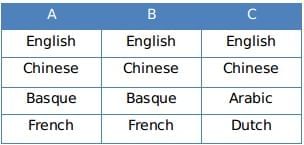
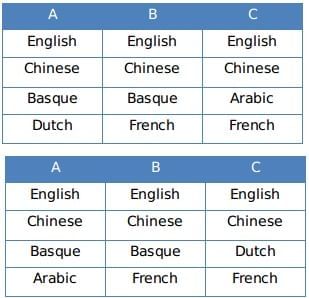 From the data given in the question, the person who speaks Arabic also speaks French. Thus the only option possible is 'Table 2'.
From the data given in the question, the person who speaks Arabic also speaks French. Thus the only option possible is 'Table 2'.
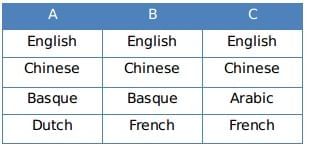
According to statement 4, "Paula and Sally are together in exactly two teams."
Sally knows Basque, thus, she will be in group A and B, with Paula.
According to statement 5, Robert (Arabic) is in Team 1 and Quentin (Dutch) is in Team 3.
Thus, Group C is Team 1 and Group A is Team 3.
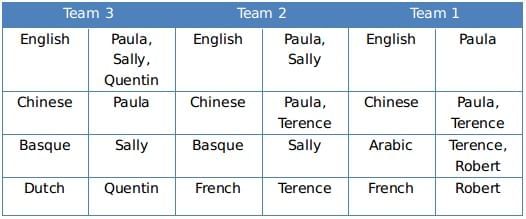
From the table, the correct option is C.
Q2: Who among the following four people is a part of exactly two teams?
(a) Paula
(b) Quentin
(c) Sally
(d) Robert
 View Answer
View Answer 
Ans: (c)
From statement 1 and 2, Each team speaks exactly four languages. English and Chinese are spoken by all three teams, Basque and French by exactly two teams and the other languages by exactly one team, multiple options are possible.
In the following tables: A, B, C can be any team among Team 1, Team 2, Team 3.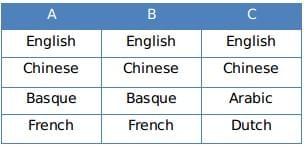
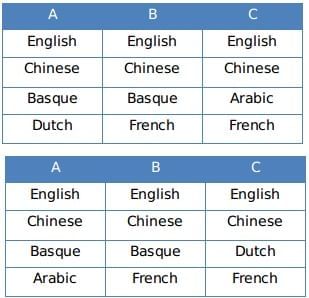 From the data given in the question, the person who speaks Arabic also speaks French. Thus the only option possible is 'Table 2'.
From the data given in the question, the person who speaks Arabic also speaks French. Thus the only option possible is 'Table 2'.
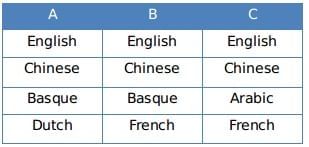
According to statement 4, "Paula and Sally are together in exactly two teams."
Sally knows Basque, thus, she will be in group A and B, with Paula.
According to statement 5, Robert (Arabic) is in Team 1 and Quentin (Dutch) is in Team 3.
Thus, Group C is Team 1 and Group A is Team 3.
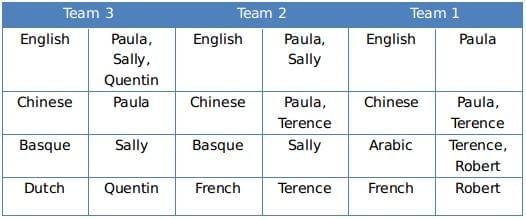
From the table, the correct option is C.
Q3: Who among the five people is a member of all teams?
(a) Terence
(b) Sally
(c) Paula
(d) No one
 View Answer
View Answer 
Ans: (c)
From statement 1 and 2, Each team speaks exactly four languages. English and Chinese are spoken by all three teams, Basque and French by exactly two teams and the other languages by exactly one team, multiple options are possible.
In the following tables: A, B, C can be any team among Team 1, Team 2, Team 3.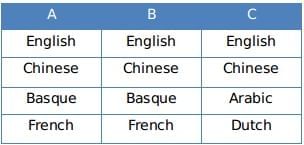
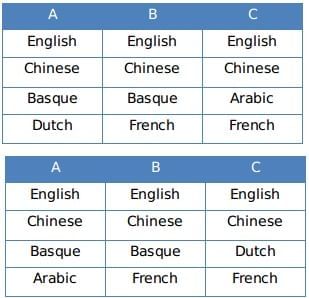 From the data given in the question, the person who speaks Arabic also speaks French. Thus the only option possible is 'Table 2'.
From the data given in the question, the person who speaks Arabic also speaks French. Thus the only option possible is 'Table 2'.
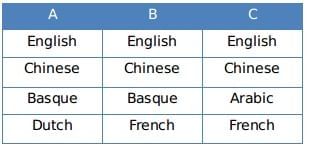
According to statement 4, "Paula and Sally are together in exactly two teams."
Sally knows Basque, thus, she will be in group A and B, with Paula.
According to statement 5, Robert (Arabic) is in Team 1 and Quentin (Dutch) is in Team 3.
Thus, Group C is Team 1 and Group A is Team 3.
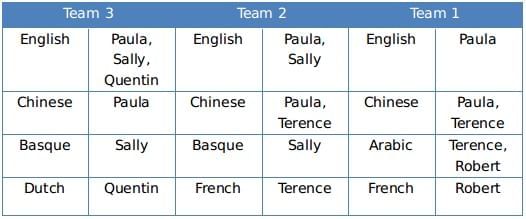
From the table, the correct option is C.
Q4: Apart from Chinese and English, which languages are spoken by Team 1?
(a) Arabic and French
(b) Basque and French
(c) Arabic and Basque
(d) Basque and Dutch
Ans: (a)
 View Answer
View Answer 
From statement 1 and 2,Each team speaks exactly four languages. English and Chinese are spoken by all three teams, Basque and French by exactly two teams and the other languages by exactly one team, multiple options are possible.
In the following tables: A, B, C can be any team among Team 1, Team 2, Team 3.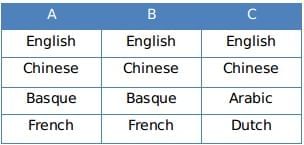
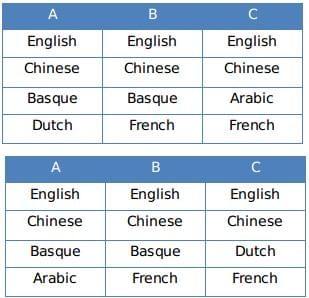 From the data given in the question, the person who speaks Arabic also speaks French. Thus the only option possible is 'Table 2'.
From the data given in the question, the person who speaks Arabic also speaks French. Thus the only option possible is 'Table 2'.
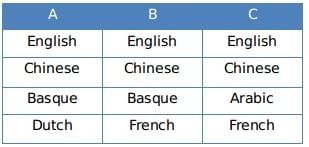
According to statement 4, "Paula and Sally are together in exactly two teams."
Sally knows Basque, thus, she will be in group A and B, with Paula.
According to statement 5, Robert (Arabic) is in Team 1 and Quentin (Dutch) is in Team 3.
Thus, Group C is Team 1 and Group A is Team 3.
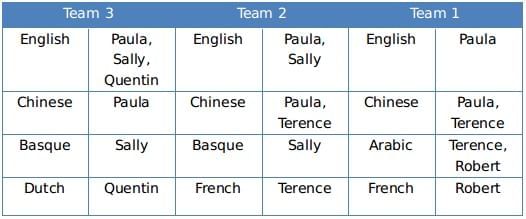
From the table, the correct option is A.
|
102 videos|123 docs|121 tests
|
FAQs on Practice Question - 53 (Selection with Condition) - 100 DILR Questions for CAT Preparation
| 1. What is the concept of selection with condition in problem-solving? |  |
| 2. How do I approach selection with condition questions in competitive exams? |  |
| 3. What types of conditions are commonly used in selection with condition problems? |  |
| 4. Can you provide an example of a selection with condition problem? |  |
| 5. Why is it important to master selection with condition for competitive exams? |  |




















